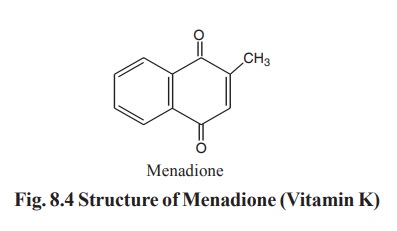Chapter: Biochemistry: Vitamins
Vitamin K
Vitamin
K
Vitamin K is known as the antihemorrhagic
vitamin.
Three compounds which have the biological
activity of vitamin K are
1.
Phylloquinone,
which is the normal dietary source, being found in green leafy vegetables.
2.
Menaquinones,
which are a family of closely related compounds synthesized by the intestinal
bacteria, with differing lengths of the side chain.
3.
Menadione,
a synthetic compound which can be metabolised to yield phylloquinone (Fig 8.4).

Functions
Vitamin K is needed for the formation of
prothrombin, a substance necessary for blood clotting.
Intestinal bacteria normally synthesize
substantial amount of vitamin K. Because vitamin K is fat soluble, its
absorption is facilitated in the presence of bile. Small amount of vitamin k
are stored in the liver, heart, skin, muscle and kidneys.
Sources
The best source of vitamin K are the green
leafy vegetables eg. spinach, cabbage, kale etc. Good sources are cauliflower,
wheat germ, etc. Carrots and potatos are fair sources. Milk, meat and fish are
poor sources.
Requirements
Vitamin K requirement depends on the amount of
vitamin K formed by the intestinal bacteria. The more the endogenous vitamin K
formation less will be the dietary requirement.
Absorption and storage
Being fat-soluble, its absorption is enhanced
by sufficient amount of bile salts mainly in the jejunum by the way of
lymphatics. Liver stores appreciable amounts. It is present in blood stream in
significant amount. All tissues contain small amounts of vitamin K.
Deficiency
The deficiency of vitamin K leads to a lowering
of prothrombin level and increased clotting time of blood. This may lead to
hemorrhagic conditions. Vitamin K deficiency causes hemorrhagic disease of the
newborn.
Related Topics